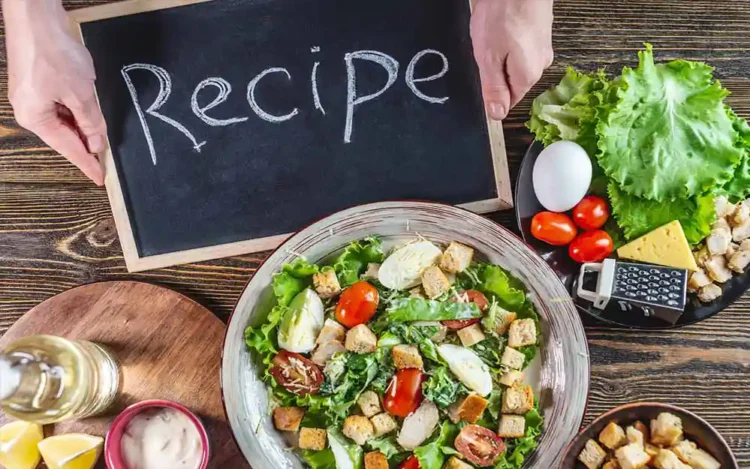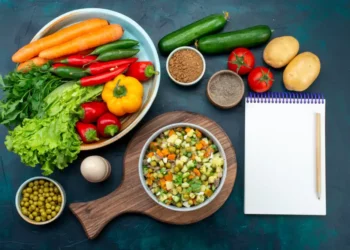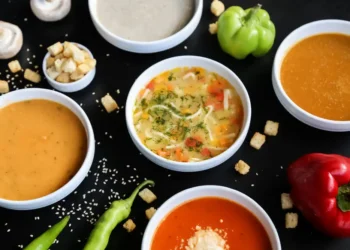Table of Contents
Welcome to our essential guide, “10 Healthy and Delicious Low-Calorie Recipes for Weight Loss” In this article, we’re diving deep into the exciting realm of tasty, yet nutritious cooking that complements your weight loss journey. Whether you’re kickstarting your path to wellness or seeking fresh culinary ideas, our handpicked recipes are designed to enhance your health without piling on the calories. We invite you to discover an array of dishes, from invigorating breakfasts to hearty dinners, complete with practical advice on marrying great taste with wholesome nutrition. Join us on this flavorful voyage as we redefine our relationship with food in the context of weight loss.
1 Introduction
Starting a weight loss journey can feel like sailing through a vast ocean of diet tips and countless recipes. The real secret to effective weight loss lies in striking the perfect balance between food that’s both enjoyable and nourishing. That’s where our collection of low-calorie recipes for weight loss comes in. They’re not just about cutting calories – they’re about enriching your diet with the right nutrients.
In this guide, we’re excited to share 10 tasty and healthful low-calorie recipes, each carefully crafted to support your weight loss journey. These recipes aren’t just about shedding pounds; they’re about delighting your taste buds and adding variety to your meals, making your dietary journey both fun and sustainable. No matter if you’re well-versed in dieting or just starting out, you’ll find these recipes simple to follow, catering to a wide range of dietary needs.
We believe weight loss is more about smart eating than just eating less. That’s why each of our recipes comes with a complete nutritional breakdown, helping you understand the full value of your meals. From satisfying breakfasts to delectable dinners, we’ve got everything to keep you on track. So let’s embark on this delicious journey of low-calorie cooking, where great taste and health go hand in hand, leading you one step at a time towards your weight loss aspirations.
2 Understanding Weight Loss and Nutrition
Weight loss might seem straightforward at first glance: just consume fewer calories than you burn. Yet, the truth is, it’s far more nuanced than that. Weight loss isn’t merely about cutting down on calories; it’s about delving deeper into the realm of nutrition and understanding how to optimize it for your body. This is where the role of carefully selected recipes for weight loss becomes key.
The emphasis on low-calorie recipes is undoubtedly important, but it’s just as crucial to ensure these calories are derived from nutrient-dense sources. There’s a prevalent myth that all low-calorie foods automatically contribute to weight loss. However, the real effectiveness of these calories in your weight loss journey hinges on their nutritional content. For instance, foods that are rich in protein, fiber, and healthy fats might be low in calories, but they’re immensely beneficial. They keep you full for longer periods, help curb cravings, and can even ramp up your metabolism.

Understanding macronutrients – carbohydrates, proteins, and fats – and their roles in weight loss is another critical element. Carbohydrates, often unfairly demonized in weight loss circles, are in fact vital for energy. The key lies in opting for complex carbs that digest slowly and keep you feeling full. Proteins are indispensable for tissue building and repair, and they play a significant role in appetite regulation. And let’s not forget about healthy fats. Contrary to common misconceptions, they’re not the enemy; in fact, they’re vital for absorbing nutrients and can be surprisingly helpful in weight loss.
In essence, achieving weight loss success is about striking a balance: consuming fewer calories while ensuring those calories are rich in nutritional value. It’s not merely about eating less; it’s about eating intelligently.
3 Benefits of Low-Calorie Recipes for Weight Loss
Low-calorie recipes play a pivotal role in any successful weight loss strategy, but their benefits extend far beyond just reducing calorie intake. Embracing low-calorie recipes is about adopting a comprehensive approach to health and nutrition.

- Fosters Portion Awareness: A key advantage of low-calorie recipes is their natural alignment with portion control, an essential component of weight loss. By prioritizing nutrient-rich ingredients, these recipes let you enjoy satisfying meal sizes while keeping your overall calorie count in check.
- Boosts Metabolic Health: These meals typically include a balanced mix of vital nutrients that can significantly improve your metabolic health. A diet incorporating plenty of vegetables, lean proteins, and whole grains – all common elements in low-calorie dishes – can enhance your metabolism, leading to a more effective calorie burn.
- Lowers Chronic Disease Risks: Regularly preparing low-calorie recipes can decrease your consumption of saturated fats, sugars, and excessive sodium, all linked to various chronic conditions like diabetes, heart disease, and hypertension. Including more fruits, vegetables, and lean proteins in your diet does more than aid weight loss; it lays the groundwork for lasting health.
- Elevates Energy and Mood: A balanced, low-calorie diet can have a positive impact on your energy levels and mood. Nutrient-packed meals ensure your body receives the essential vitamins and minerals it needs, enhancing your overall well-being.
- Encourages Lasting Weight Loss: Unlike quick-fix diets that may offer rapid but fleeting results, low-calorie recipes promote a gradual, sustainable weight loss journey. This method is more likely to yield long-term success and help maintain a healthy weight.
In summary, incorporating low-calorie recipes into your lifestyle is not just about weight management; it’s about nurturing your overall health, energy, and well-being.
4 Recipe 1: Breakfast Option
Breakfast is often called the most important meal of the day, and for good reason. It kick-starts your metabolism and can set the tone for your eating habits throughout the day. For those on a weight loss journey, a nutritious, low-calorie breakfast can be a game-changer. Let’s dive into a delicious breakfast recipe that’s not only low in calories but also packed with nutrients.

Spinach and Mushroom Egg White Omelette
Ingredients:
- 3 egg whites
- 1 cup fresh spinach
- ½ cup sliced mushrooms
- 1 tbsp chopped onions
- 1 clove garlic, minced
- Salt and pepper to taste
- 1 tsp olive oil
Instructions:
- Heat the olive oil in a non-stick skillet over medium heat.
- Sauté onions and garlic until they’re translucent.
- Add the mushrooms and cook until they’re soft.
- Toss in the spinach and cook until it wilts.
- In a bowl, whisk the egg whites with salt and pepper.
- Pour the egg whites over the vegetables in the skillet.
- Cook for 2-3 minutes, then fold the omelette in half.
- Cook for another 2 minutes until the egg whites are fully set.
- Serve hot.
Nutritional Information: This egg white omelette is high in protein, low in calories, and rich in vitamins and minerals. It’s an ideal breakfast option for weight loss, providing sustained energy without the calorie overload.
5 Recipe 2: Lunch Option
Lunch is a critical meal in your day, especially when following recipes for weight loss. It should be filling enough to keep you energized for the rest of the day, yet light enough to not weigh you down. Here’s a lunch recipe that’s perfectly balanced for both nutrition and taste.

Grilled Chicken Salad with Mixed Greens
Ingredients:
- 150g skinless chicken breast
- 2 cups mixed greens (lettuce, spinach, arugula)
- ½ cup cherry tomatoes, halved
- ¼ cucumber, sliced
- 1 small carrot, grated
- 2 tbsp balsamic vinaigrette
- Salt and pepper to taste
- 1 tsp olive oil (for grilling)
Instructions:
- Season the chicken breast with salt and pepper.
- Heat olive oil in a grill pan over medium heat.
- Grill the chicken for about 5-7 minutes on each side, until fully cooked.
- Let the chicken rest for a few minutes, then slice it.
- In a large bowl, combine the mixed greens, cherry tomatoes, cucumber, and carrot.
- Add the grilled chicken slices to the salad.
- Drizzle with balsamic vinaigrette and toss gently.
- Serve immediately.
Nutritional Information: This grilled chicken salad is a powerhouse of nutrients. It’s rich in protein, thanks to the chicken, and packed with vitamins, minerals, and fiber from the variety of vegetables. The balsamic vinaigrette adds a zesty flavor without adding too many calories, making it an excellent choice for a weight loss-friendly lunch
6 Recipe 3: Dinner Option
Dinner is an essential meal, especially in a weight loss regimen. It’s important to choose recipes that are light yet satisfying to prevent late-night snacking. Here’s a dinner recipe that’s not only in line with your weight loss goals but is also a delight to your taste buds.

Baked Salmon with Steamed Broccoli and Quinoa
Ingredients:
- 150g salmon fillet
- 1 cup broccoli florets
- ½ cup quinoa
- 1 lemon, sliced
- 1 tbsp olive oil
- Salt, pepper, and herbs (dill or parsley) to taste
Instructions:
- Preheat your oven to 180°C (350°F).
- Place the salmon on a baking sheet lined with parchment paper.
- Drizzle olive oil over the salmon and season with salt, pepper, and herbs.
- Lay lemon slices on top of the salmon.
- Bake in the preheated oven for 15-20 minutes, or until the salmon is cooked through.
- While the salmon is baking, rinse the quinoa under cold water and cook it according to package instructions.
- Steam the broccoli florets until tender, which should take about 3-5 minutes.
- To assemble, place the cooked quinoa on a plate, top with the baked salmon, and add the steamed broccoli on the side.
Nutritional Information: This recipe is a nutritional powerhouse, perfect for a weight loss-focused dinner. Salmon is a great source of omega-3 fatty acids and high-quality protein. Quinoa is a whole grain that’s high in fiber and protein, and broccoli is rich in vitamins and minerals. This combination makes for a balanced meal that is satisfying yet low in calories.
7 Snack Options
When it comes to weight loss, snacking can be a double-edged sword. It’s essential to choose snacks that satisfy hunger without adding excessive calories. Here, we’ll explore some snack options that are perfect for a weight loss diet, aligning with the goal of keeping meals both nutritious and low in calories.
1. Greek Yogurt with Berries and Honey
- A bowl of Greek yogurt topped with a handful of berries and a drizzle of honey is not only delicious but also packed with protein and antioxidants.

2. Vegetable Sticks with meat
- Crunchy vegetable sticks (like carrots, cucumbers, and bell peppers) dipped in a small serving of meat make for a filling and nutritious snack.
3. Apple Slices with Almond Butter
- Apple slices spread with a thin layer of almond butter offer a satisfying mix of sweet and nutty flavors, along with fiber and healthy fats.
4. Mixed Nuts
- A small handful of mixed nuts provides a quick, protein-rich snack. Opt for unsalted varieties to keep sodium intake low.
5. Air-Popped Popcorn
- Air-popped popcorn is a low-calorie snack that can be seasoned with a sprinkle of nutritional yeast or a dash of cinnamon for added flavor without extra calories.
8 Vegetarian and Vegan Recipes
Adopting a vegetarian or vegan diet can be a highly effective approach to weight loss. These diets often emphasize whole, plant-based foods that are naturally lower in calories and higher in essential nutrients. Here, we’ll explore some vegetarian and vegan recipes that are not only conducive to weight loss but also delicious and satisfying.

1. Quinoa and Black Bean Stuffed Bell Peppers
- These stuffed peppers combine the protein-rich quinoa and black beans with a variety of spices, offering a flavorful and filling meal.
2. Lentil Soup with Vegetables
- A hearty lentil soup packed with vegetables like carrots, celery, and tomatoes is both comforting and nutritious, perfect for a low-calorie yet fulfilling meal.
3. Tofu Stir-Fry with Mixed Vegetables
- This stir-fry uses firm tofu and a medley of colorful vegetables, all tossed in a light soy sauce-based marinade, making it a great source of protein and fiber.
4. Chickpea and Avocado Salad
- A refreshing salad made with chickpeas, avocado, cucumber, and tomatoes, dressed in a lemon vinaigrette, is not only tasty but also heart-healthy and filling.
5. Vegan Buddha Bowl
- A Buddha bowl, featuring a base of brown rice or quinoa, topped with roasted sweet potatoes, steamed greens, and a variety of raw vegetables, all drizzled with a tahini sauce, is a nutrient-packed option.
9 Gluten-Free Options
For individuals following a gluten-free diet, finding recipes for weight loss that cater to this need can sometimes be challenging. Gluten-free diets exclude wheat, barley, and rye, but there are plenty of nutritious and delicious alternatives available. Here are some gluten-free recipes that are perfect for anyone looking to lose weight without compromising on taste or variety.

1. Zucchini Noodles with Pesto and Cherry Tomatoes
- Replace traditional pasta with zucchini noodles for a low-calorie, gluten-free alternative. Toss them in homemade pesto and add cherry tomatoes for a fresh, flavorful dish.
2. Quinoa Salad with Grilled Vegetables
- Quinoa is a versatile, gluten-free grain that pairs wonderfully with grilled vegetables like bell peppers, zucchini, and eggplant, dressed in a light vinaigrette.
3. Baked Sweet Potato and Black Bean Tacos
- Use gluten-free corn tortillas to make tacos filled with baked sweet potatoes and black beans. Top with avocado, lime juice, and cilantro for a satisfying meal.
4. Chicken and Vegetable Stir-Fry with Tamari Sauce
- Stir-fry chicken and a variety of vegetables like broccoli, carrots, and snap peas in tamari sauce, a gluten-free alternative to soy sauce.
5. Butternut Squash Soup
- This creamy butternut squash soup is naturally gluten-free and makes for a warm, comforting meal that’s low in calories but high in nutrients.
10 Meal Planning Tips
Meal planning is a cornerstone of maintaining a healthy diet and is particularly crucial when you’re focusing on recipes for weight loss. By planning your meals in advance, you can ensure that you’re consuming the right balance of nutrients, avoiding unhealthy choices, and sticking to your weight loss goals. Here are some practical meal planning tips to help you stay on track.
1. Start with a Weekly Plan: Begin by mapping out your meals for the week. This includes breakfast, lunch, dinner, and any snacks. Use the recipes for weight loss discussed earlier as a foundation for your plan, ensuring variety and nutritional balance.
2. Prep in Advance: Once you have your plan, prepare as much as you can in advance. This might mean chopping vegetables, cooking grains, or even prepping entire meals that can be easily reheated. Meal prep can save time during the week and make it easier to stick to your plan.
3. Portion Control: Be mindful of portion sizes. Even with healthy meals, consuming too much can hinder your weight loss efforts. Use measuring cups or scales to ensure accurate portions, especially for calorie-dense foods like nuts and oils.
4. Keep Healthy Snacks Handy: Plan for healthy snacks to avoid reaching for high-calorie options. Fresh fruits, vegetables with hummus, and Greek yogurt are great choices that can be included in your meal plan.
5. Stay Flexible: While it’s important to stick to your plan, allow some flexibility. Life can be unpredictable, so if you need to swap meals around or adjust your plan, that’s okay. The key is to make conscious choices and adapt as needed.
6. Monitor and Adjust: As you follow your meal plan, take note of how you feel and how well you’re progressing toward your weight loss goals. Don’t hesitate to adjust your plan based on what works best for you.
11 Balancing Flavor and Nutrition
Achieving a balance between flavor and nutrition is key in creating recipes for weight loss that are both satisfying and effective. The challenge lies in making nutritious meals taste good without adding excessive calories or unhealthy ingredients. Here are some tips to strike the perfect balance in your cooking.
1. Use Herbs and Spices: Herbs and spices are calorie-free ways to enhance the flavor of your meals. Experiment with a variety of herbs like basil, cilantro, or rosemary, and spices like cumin, paprika, or cinnamon to add depth and complexity to your dishes.
2. Incorporate Healthy Fats: Healthy fats like olive oil, avocado, and nuts can add richness and flavor to meals without compromising their nutritional value. Remember, moderation is key since fats are calorie-dense.
3. Choose Flavorful Cooking Methods: Techniques like grilling, roasting, and stir-frying can bring out the natural flavors of foods without needing much oil or butter. For example, roasting vegetables caramelizes their natural sugars, enhancing their taste.
4. Make Use of Citrus and Vinegars: Adding a splash of citrus juice or vinegar can brighten up a dish and add a fresh zing without adding significant calories.
5. Utilize Natural Sweeteners: Instead of sugar, use natural sweeteners like honey, maple syrup, or ripe fruits to add a touch of sweetness to your recipes. These options are healthier and add more than just sweetness to a dish.
As we explore the health benefits and nutritional profiles of the ingredients used in our low-calorie recipes for weight loss, it’s helpful to have accurate, detailed information at your fingertips. For comprehensive nutritional data, the USDA’s FoodData Central is an invaluable resource. For more detailed insights into the calories, vitamins, and minerals that these ingredients contain, feel free to explore further by visiting USDA’s FoodData Central.”
12 Exercise and Healthy Lifestyle Tips
While diet, including recipes for weight loss, plays a crucial role in shedding pounds, incorporating exercise and adopting healthy lifestyle habits can significantly enhance your weight loss efforts. Let’s delve into some practical tips to complement your dietary changes with physical activity and healthy living.

1. Regular Physical Activity: Engage in regular exercise, such as brisk walking, jogging, swimming, or cycling. Aim for at least 150 minutes of moderate aerobic activity or 75 minutes of vigorous activity each week, along with strength training exercises twice a week.
2. Stay Hydrated: Drinking enough water is essential for overall health and can aid in weight loss. It helps in metabolism and can act as an appetite suppressant. Aim for at least 8-10 glasses of water a day.
3. Get Adequate Sleep: Quality sleep is often overlooked in weight loss plans. Aim for 7-9 hours of sleep per night, as poor sleep can affect your metabolism and appetite-regulating hormones.
4. Manage Stress: High stress can lead to overeating or unhealthy eating habits. Practice stress management techniques such as yoga, meditation, or deep breathing exercises.
5. Monitor Progress: Keep track of your weight loss journey, including diet and exercise. Use tools like food diaries, fitness apps, or journals to monitor your progress and stay motivated.
13 Conclusion
In conclusion, embarking on a journey of weight loss involves more than just following recipes for weight loss; it’s about embracing a comprehensive approach that combines nutritionally balanced meals with a healthy lifestyle. The key is to find joy and satisfaction in the foods you eat and the life you lead, making the process of losing weight not just effective but also enjoyable and sustainable.
Remember, every meal is an opportunity to nourish and respect your body. The recipes and tips provided here are designed to help you achieve your weight loss goals without sacrificing flavor or nutrition. Consistency is crucial, and small, sustainable changes can lead to significant long-term results.
Stay motivated and patient; weight loss is a journey, not a race. It’s about making healthier choices every day and finding a balance that works for you. With the right mindset and resources, you’re well on your way to achieving and maintaining a healthy weight.











